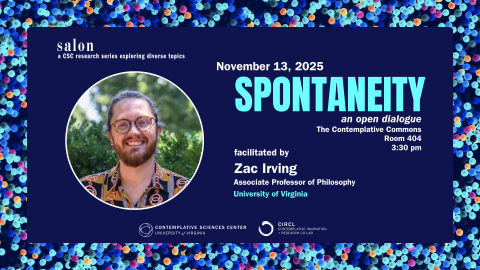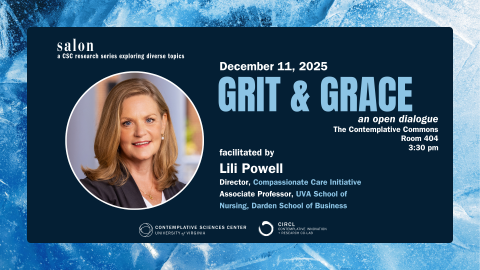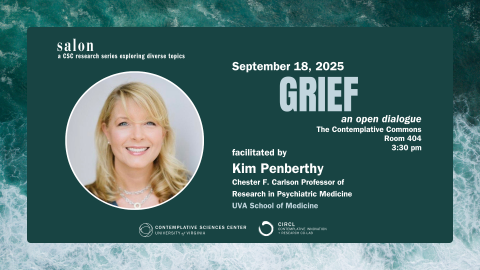Salon
About Salon
Salons are monthly open dialogues on cutting-edge research related to contemplation and flourishing with UVA and local community members in the Contemplative Commons, hosted by the Contemplative Sciences Center's CIRCL: Contemplative Innovation + Research Co-Lab. Centered on a single word, these gatherings bring together scholars, scientists, and practitioners from diverse perspectives to exchange ideas, generate knowledge, and seek solutions to global challenges. CSC Research home.
Fall 2025
Kim Penberthy: GRIEF
Kim brings her research and clinical expertise on grief to the Contemplative Sciences Center Salon. Drawing on decades of work with individuals navigating loss, she highlights contemplative and therapeutic approaches to understanding and healing grief. This gathering invites faculty, students, and community members into a shared dialogue across disciplines and experiences, fostering reflection, connection, and resilience. Together, participants will explore grief not only as a personal journey but as a communal human experience.
Dr. J. Kim Penberthy is Chester F. Carlson Professor at UVA’s School of Medicine.
Zac Irving: SPONTANEITY
Register
Spontaneous forms of thought such as mind-wandering foster creativity and exploration. But digital technologies may be crowding out spontaneity: In the past, during idle times such as waiting for a bus, our minds were more accustomed to wandering. Now we are stuck on our phones. How can we make room for spontaneity in a digital world?
Zac Irving is Associate Professor at the University of Virginia's Corcoran Department of Philosophy, where he works in the philosophy of cognitive science.

Lili Powell: GRIT AND GRACE
Popular notions of mindfulness and contemplation tend strongly toward “calming.” Yet “calming” only tells half the story, which can be deeply problematic when clarity and action are desired or called for. Alternatively, “grit and grace” resonates better with the professional audiences in business and healthcare that I work with. “Grit” captures focus and determination, while “grace” captures composure and compassion. Together these terms reflect in simple terms the mechanisms of “inner work” (managing one’s own nervous system) and “outer work” (managing one’s presence and influence in the world). In this salon, I invite reactions to this framing and seek ideas about how to support “grit and grace” with evidence-based research and wisdom traditions.
Lili Powell is Associate Professor at the Darden School and Nursing School; and Director of the Compassionate Care Initiative.

UPCOMING EVENT
Check out SENSEmaking: A Symposium on Contemplative Technologies, a two-day public symposium exploring contemplative practices, immersive technology, and the senses.
October 9–10, 2025
Contemplative Sciences Center, Contemplative Commons, University of Virginia
Free for students - Open to the public - Registration required
Past Salons
Spring 2025
Julia Cassaniti: Frequency
How do people make sense of the possibly random but sometimes patterned experiences around them, and why do patterns appear to some people – and as meaningful to some people – more than others? In this Salon discussion, we will explore the moments of repetition in our everyday and contemplative encounters. The discussion will focus on a common phenomenon called the ‘frequency illusion’: a quirk of perception whereby something newly attuned to will suddenly seem to be ubiquitous. We will discuss these moments of unusual frequency, and seek to understand their connections to attention and perception in the work of making meaning in our lives.

March 20, 2025 3:30-5:00pm
Jack Petranker: Stories
We tell stories to make sense of what is happening. When the stories we tell about our lives substitute for the immediacy of experience, this can be deeply problematic. Caught in our stories, we live on the surface of our lives. But we do not have to set our stories aside. We can inhabit them and them come alive. Contemplative traditions sometimes ask us to let go of our stories, but the real trick is not to get lost in their content, and instead use the power of stories in creative and healing ways.

April 10, 2025 3:30-5:00pm
Devin Zuckerman: Sensory Overload
We know it when we feel it—but what does “sensory overload” really mean? In this conversation, we’ll explore the complexities of multi-sensory experience: how our senses shape who we are, how they are co-opted, and how they might be reclaimed. Drawing on a little research and a lot of observation, we’ll reflect together on sensing and sensory processes—and what’s at stake when they’re overwhelmed. We’ll consider three perspectives on sensory overload: the experience of sensing too much (aesthetic shock), the sensory stirrings that move us to ethical action (saṃvega), and what happens when our senses get slippery and spill into one another (synaesthesis).

May 8, 2025 3:30-5:00pm
Matthew Burtner: Time
What is time and how do we know it? Music is a time art of vibration, and composers structure sound in time, perhaps like sculptors shape material in space. In this salon, we will listen to a couple of sound experiments to consider perspectives and contexts of time. My research explores sonic environmental temporalities, sometimes outside the frame of human perception, such as melting glaciers, atmospheric profiles, reef regeneration, or moth hearing. I hope that by considering time in an interdisciplinary forum, we can raise questions about the complex intersections between time, being, physics, phenomenology, and sound.
You do not need to prepare anything to attend the salon, but if you have time, feel free to listen to “Sonic Physiography of a Time-Stretched Glacier” from the album Glacier Music, on Spotify or wherever you find music.

Fall 2024
October 8, 2024 3:30-5pm
Michael Sheehy: Contemplation
Join the Contemplative Sciences Center on October 8 for a discussion on "Contemplation" facilitated by Michael Sheehy. This session is the first in a monthly series of salons, open dialogues, held at the Contemplative Commons and centered around cutting-edge research related to contemplation and flourishing. The gatherings convene scholars, scientists, and practitioners from diverse perspectives to exchange ideas, generate knowledge, and seek solutions to global challenges.

November 14, 2024 3:30-5pm
Michael Lifshitz: Tulpa
Tulpamancy is the practice of training the imagination to create invisible mental companions called “tulpas.” Inspired by the illusory form practices of Tibetan Buddhist dream yoga, a secular form of tulpamancy has been gaining popularity over the last decade. Practitioners report that, with time and training, their tulpa comes to feel like an autonomous agent sharing the private space of their mind, and even to develop its own parallel stream of subjectivity. In this salon, I will describe findings from a study exploring the phenomenology and neurocognitive mechanisms of tulpamancy.

December 12, 2024 3:30-5pm
Kelsey Johnson: Darkness
My work in the classroom is heavily influenced by embracing and promoting students’ sense of curiosity and wonder, which I argue is at the core of fostering life-long learners. My work as the founder of the award-winning “Dark Skies, Bright Kids” outreach program for elementary school students has strengthened my conviction that astronomy can serve as a powerful tool for rekindling a love of science in students who have pursued other disciplines. I am a champion for the importance of science literacy in modern society; our understanding of how science works and how to interpret scientific findings has consequences for issues ranging from the mundane to the profound.

